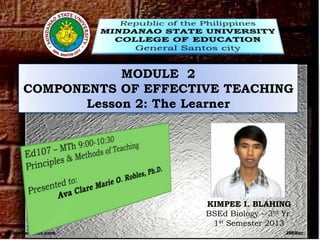
Learner: Definition and theories of learning, Student’s Learning Style, and Theory of Multiple Intelligences
- 1. MODULE 2 COMPONENTS OF EFFECTIVE TEACHING Lesson 2: The Learner KIMPEE I. BLAHING BSEd Biology – 3rd Yr. 1st Semester 2013
- 2. MODULE 2: COMPONENTS OF EFFECTIVE TEACHING Lesson 2: The Learner A.Definition and theories of learning B.Student’s Learning Style C.Theory of Multiple Intelligences
- 3. Definition and theories of learning Behaviorism Ivan Pavlov – Classical Conditioning B.F. Skinner – Operant Conditioning John B. Watson Edward Thorndike - Connectionism
- 4. •Abraham Maslow The Hierarchy of Needs Definition and theories of learning
- 5. Definition and theories of learning Cognitive Approach Cognitive Learning Theories includes: •Gestalt Psychology – Insight Theory •Edward Toleman – Purposive Behaviorism •Albert Bandura – Observational Learning; and •Jean Piaget – Theory of Cognitive Development
- 6. Student’s Learning Style What is a “learning style”? • “The way that he or she concentrates on, processes, internalizes, and remembers new and difficult information or skills”. –Dr. Rita Dunn, St. John’s University
- 7. • “Characteristic cognitive, affective, and physiological behaviors that serve as relatively stable indicators of how learners perceive, interact with, and respond to the learning environment”. –James W. Keefe Student’s Learning Style What is a “learning style”?
- 8. Student’s Learning Style Learning Style - In Simple Terms Conceptual Understanding • Children learn through a combination of these elements: – Physiological – Cognitive – Affective
- 9. Physiological Elements • Physiological elements are primarily biologically-based and vary depending on the learner’s reaction to the physical environment. –Environmental Elements –Emotional Elements –Sociological Elements –Physical Elements. Conceptual Understanding
- 10. Cognitive Elements • Brain Dominance • Conceptual Tempo • Mind styles • Psychological Differentiation • Modality • Multiple Intelligences Conceptual Understanding
- 11. Brain Dominance What is the way in which the brain analyzes information? •Analytical •Global •Integrated Conceptual Tempo •Impulsive •Reflexive Mindstyles •Concrete Sequential •Abstrate Random
- 13. Affective Elements • Affective elements are the motivational forces within a learner typically viewed as stimulating and guiding behavior. –Conceptual Level –Psychological Types Conceptual Understanding
- 14. Conceptual Level • High –These students are more independent. They enjoy individual projects, problem solving, and a choice of assignments. • Low –These see environment as fixed and rigid. They are not able to look at alternative solutions to problems.
- 15. Psychological Types • Thinker – These learners are more objective and reason logically their decisions. • Sensor – These learners relate best to the real world and concrete experiences. • Feeler – These learners make decisions based more on their emotions and insight than reason. • Intuitor – These learners relate to the world through intuition. They are more global and more apt to dislike detailed work.
- 16. The Theory of Multiple Intelligences the ability to create an effective product or offer a service that is valued in a culture; a set of skills that make it possible for a person to solve problems in life; the potential for finding or creating solutions for problems, which involves gathering new knowledge For Gardner, intelligence is:
- 18. REFERENCES: Acero, Victoria, et.al. (2000). Principles and Strategies of Teaching. Rex Bookstore Publishing. Manila, Philippines Acero, Victorina, et.al. (2004). Human Growth, Development, and Learning..Rex Bookstore, Inc. Manila, Philippines. childrensministry. Learning Styles. Retrieved on Saturday 21June 2013 at http://www.slideshare.net/childrensministry/learning-styles?from_search=1 Howard Gardners’s Multipple Intelligence. Retrieved last June 30, 2013 Sunday from http://www.pbs.org/wnet/gperf/education/ed_mi_overview.html Keesee, Gayla. Learning Theories & the Net Generation. Retrieved on Sat 22 June 2013 at http://www.slideshare.net/gskeesee/learning-theories-341414?from_search=1 Salandanan, Gloria G.(2009). Methods of Teaching. Lorimar Publishing,Inc., Metro Manila, Philippines Vera, Veronica. Multiple intelligences. Retrieved last Saturday June 22, 2013 at http://www.slideshare.net/verovera78/multiple-intelligneces-final?from_search=7
